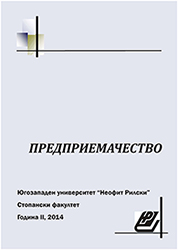ТЕОРИЯ НА ИГРИТЕ С ПРИЛОЖЕНИЕ ЗА ТУРИСТИЧЕСКАТА СФЕРА
THE GAME THEORY WITH APPLICATIONS TO THE TOURISM SPHERE
Author(s): Ivanka VasenskaSubject(s): Economy
Published by: ЮГОЗАПАДЕН УНИВЕРСИТЕТ »НЕОФИТ РИЛСКИ«
Keywords: Game Theory; Multilateral Decision-Making; Tourism Management; Mathematical Models
Summary/Abstract: The Game theory, like other mathematical models in economics examines economic phenomena, focusing on selected, relevant factors. The term "game" have been chosen due to the fact that a methodology reduces and often complicates research structure to what appears like a cooperative games. As a result, we receive simplified representation of the research process. A good model illuminates the underlying forces that are not clearly visible when we take a look into detail beyond the surface. The theoretical conclusions of the model can be applied in practice to every day cases in order to improve our understanding on various strategic issues, etc.Conservative economics methodology assumes that a participant who has no control over external variables, or more participants can not by any of its individual action to affect the operations of another participant. This traditional methodology ignores the influence of the individuals’ actions, the other (s), and vice versa. Von Neumann and Morgenstern (1944) were the first researchers who applied game theory to economics, recognizing the importance of interaction between the participants in an economic process. The essence is based on multilateral decision-making. Thus, the methodology is applied in situations where individuals and/or companies operate on interdependent, competitive surrounding.The aim of this paper is to present the methodology of "game theory" to demonstrate how it can improve our understanding of studied phenomena, and define its possible application in the art of tourism research.The article is organized into two main parts, in the first we examine key concepts theory, where we discuss the concept of "players", "information", "utility", "solutions" and "balance." In the second section we present several hypothetical case studies in the tourism sphere, whose methodology can lead to resolution not offered by other approaches, previously applied in the field.
Journal: Предприемачество
- Issue Year: 2/2014
- Issue No: 1&2
- Page Range: 84-102
- Page Count: 19
- Language: Bulgarian

